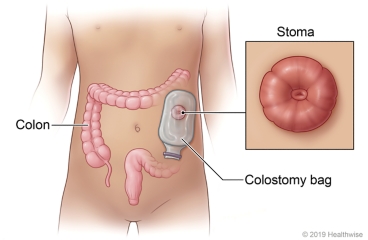
What is a colostomy?
A colostomy is surgery to make an opening in the skin on the belly and connect your child's bowel (colon) to that opening. The opening is called a stoma. The stoma may be needed for weeks to months. Or it may be needed throughout your child's life.
After surgery, stool will no longer leave your child's body through the anus. It will go through the stoma and into a plastic bag. The bag is attached to the stoma.
The surgery can be done in two ways. In laparoscopic surgery, the doctor makes several small cuts (incisions) in the belly. Then the doctor puts a thin, lighted tube and special surgical tools through the incisions. The tube is called a scope. It lets the doctor see your child's organs and do the surgery. In open surgery, the doctor makes one larger cut in the belly. In either surgery, the incisions leave scars. These will fade with time.
You and your child may worry about life after this surgery. But many people with colostomies lead active, normal lives. It may help to know that the bags don't smell bad. They also don't show under clothes. Most people won't know that your child has a colostomy unless you or your child chooses to tell them.
In the hospital, an ostomy nurse will help you and your child learn to care for the stoma. Your child will probably go home in about a week. But it could take several weeks to fully recover. Your doctor will tell you when your child can go back to normal activities.
How do you prepare for surgery?
Surgery can be stressful for both your child and you. This information will help you understand what you can expect. And it will help you safely prepare for your child's surgery.
 Preparing for surgery
Preparing for surgery
- Talk to your child about the surgery. Say that it will help your child's body get rid of waste. Hospitals know how to take care of children. The staff will do all they can to make it easier for your child.
- Ask if a special tour of the surgery area and hospital is available. This may make your child feel less nervous about what happens.
- Plan for your child's recovery time. Your child may need more of your time right after the surgery, both for care and for comfort.
- Understand exactly what surgery is planned, along with the risks, benefits, and other options.
- Tell the doctor ALL the medicines, vitamins, supplements, and herbal remedies your child takes. Some may increase the risk of problems during the surgery. Your doctor will tell you if your child should stop taking any of them before the surgery and how soon to do it.
The day before surgery
- A nurse may call you (or you may need to call the hospital). This is to confirm the time and date of your child's surgery and answer any questions.
- Remember to follow your doctor's instructions about your child taking or stopping medicines before surgery. This includes over-the-counter medicines.
What happens on the day of surgery?
- Follow the instructions exactly about when your child should stop eating and drinking. If you don't, your child's surgery may be canceled. If your doctor told you to have your child take any medicines on the day of surgery, have your child take them with only a sip of water.
- Follow the doctor's instructions about when your child should bathe or shower before the procedure. Do not apply lotion or deodorant.
- Your child may brush their teeth. But tell your child not to swallow any toothpaste or water.
- Do not let your child wear contact lenses. Bring your child's glasses or contact lens case.
- Have your child take off all jewelry and piercings.
- Be sure your child has something that's a reminder of home. A special stuffed animal, toy, or blanket may be comforting. For an older child, it might be a book or music.
 At the hospital
At the hospital
- A parent or legal guardian must accompany your child.
- Your child will be kept comfortable and safe by the anesthesia provider. Your child will be asleep during the surgery.
- The surgery will take a few hours.
- After surgery, your child will be taken to the recovery room. As your child wakes up, the recovery staff will monitor your child's condition. The doctor will talk to you about the surgery.
- Your child will have a colostomy bag attached to the stoma on your child's belly. Stool will leave the body through the stoma and go into the bag. Colostomy stool is softer and more liquid than normal stool.
- After surgery, the bowel usually "rests" for a few days before it starts to work again.
- Your child may have a thin plastic tube in the nose that goes into the stomach. It drains stomach juices and prevents nausea. The drainage usually looks green, brown, or even black with a bit of blood. This tube is usually removed after a few days. Then your child can start to drink and eat again.
Current as of: October 1, 2025
Author: Ignite Healthwise, LLC Staff
Clinical Review Board
All Ignite Healthwise, LLC education is reviewed by a team that includes physicians, nurses, advanced practitioners, registered dieticians, and other healthcare professionals.

